英语46级
- 格式:doc
- 大小:260.50 KB
- 文档页数:32
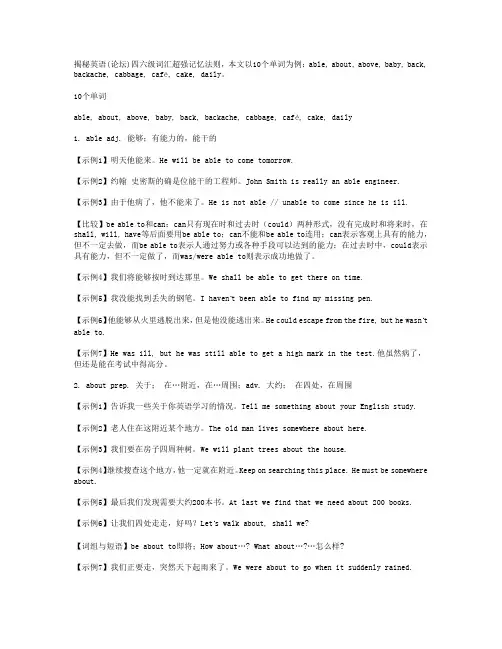
揭秘英语(论坛)四六级词汇超强记忆法则,本文以10个单词为例:able, about, above, baby, back, backache, cabbage, café, cake, daily。
10个单词able, about, above, baby, back, backache, cabbage, café, cake, daily1. able adj. 能够;有能力的,能干的【示例1】明天他能来。
He will be able to come tomorrow.【示例2】约翰史密斯的确是位能干的工程师。
John Smith is really an able engineer.【示例3】由于他病了,他不能来了。
He is not able // unable to come since he is ill.【比较】be able to和can:can只有现在时和过去时(could)两种形式,没有完成时和将来时,在shall, will, have等后面要用be able to;can不能和be able to连用;can表示客观上具有的能力,但不一定去做,而be able to表示人通过努力或各种手段可以达到的能力;在过去时中,could表示具有能力,但不一定做了,而was/were able to则表示成功地做了。
【示例4】我们将能够按时到达那里。
We shall be able to get there on time.【示例5】我没能找到丢失的钢笔。
I haven’t been able to find my missing pen.【示例6】他能够从火里逃脱出来,但是他没能逃出来。
He could escape from the fire, but he wasn’t able to.【示例7】He was ill, but he was still able to get a high mark in the test.他虽然病了,但还是能在考试中得高分。
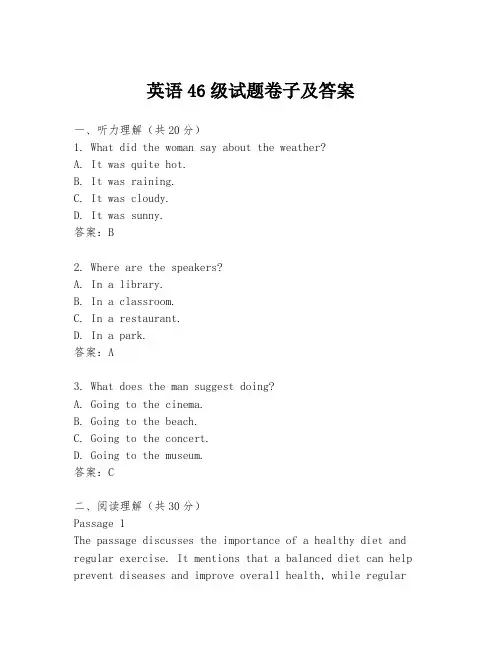
英语46级试题卷子及答案一、听力理解(共20分)1. What did the woman say about the weather?A. It was quite hot.B. It was raining.C. It was cloudy.D. It was sunny.答案:B2. Where are the speakers?A. In a library.B. In a classroom.C. In a restaurant.D. In a park.答案:A3. What does the man suggest doing?A. Going to the cinema.B. Going to the beach.C. Going to the concert.D. Going to the museum.答案:C二、阅读理解(共30分)Passage 1The passage discusses the importance of a healthy diet and regular exercise. It mentions that a balanced diet can help prevent diseases and improve overall health, while regularexercise can increase energy levels and reduce stress.41. What is the main topic of the passage?A. The benefits of a healthy diet.B. The importance of exercise.C. The relationship between diet and exercise.D. The role of stress in health.答案:A42. What does the passage suggest about a balanced diet?A. It can prevent diseases.B. It can increase energy levels.C. It can reduce stress.D. It can improve overall health.答案:A43. What is the purpose of exercise according to the passage?A. To prevent diseases.B. To increase energy levels.C. To reduce stress.D. To improve overall health.答案:BPassage 2The passage talks about the impact of technology on education. It highlights how technology has made learning moreaccessible and interactive, but also raises concerns aboutthe potential negative effects on students' attention spans and the quality of education.44. What is the main concern of the passage?A. The accessibility of education.B. The interactivity of learning.C. The negative effects of technology on education.D. The positive effects of technology on education.答案:C45. What does the passage imply about students' attention spans?A. They have improved due to technology.B. They have decreased due to technology.C. They are not affected by technology.D. They are not mentioned in the passage.答案:B46. What is the author's opinion on the quality of education?A. It has improved with technology.B. It has declined with technology.C. It remains the same.D. It is not discussed in the passage.答案:B三、完形填空(共20分)The article discusses the importance of teamwork and collaboration in achieving success in both personal and professional settings.47. The word "cooperation" in the first paragraph is closest in meaning to:A. CompetitionB. CollaborationC. IsolationD. Conflict答案:B48. According to the article, what is a key factor in successful teamwork?A. Individual talentB. Clear communicationC. Personal ambitionD. Strict hierarchy答案:B49. The author suggests that teamwork can lead to:A. Increased productivityB. Decreased moraleC. Higher costsD. Lower efficiency答案:A50. What is the main message of the article?A. Teamwork is essential for success.B. Teamwork is always easy.C. Teamwork is unnecessary.D. Teamwork is only for certain situations.答案:A四、翻译(共30分)51. 请将以下句子翻译成英文:- 他决定放弃这份工作,因为他对公司的未来没有信心。
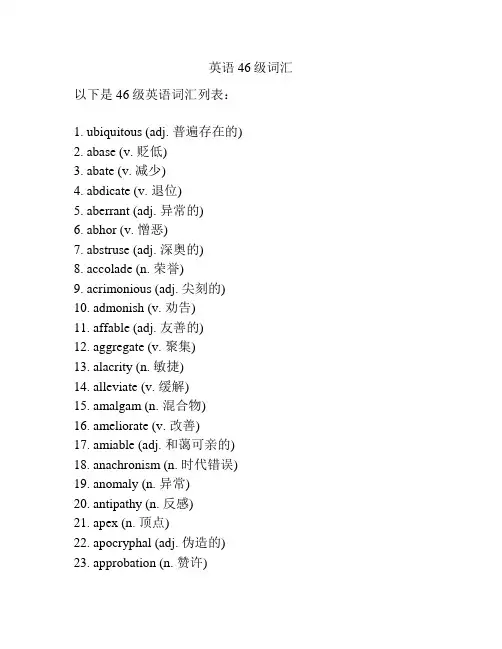
英语46级词汇以下是46级英语词汇列表:1. ubiquitous (adj. 普遍存在的)2. abase (v. 贬低)3. abate (v. 减少)4. abdicate (v. 退位)5. aberrant (adj. 异常的)6. abhor (v. 憎恶)7. abstruse (adj. 深奥的)8. accolade (n. 荣誉)9. acrimonious (adj. 尖刻的)10. admonish (v. 劝告)11. affable (adj. 友善的)12. aggregate (v. 聚集)13. alacrity (n. 敏捷)14. alleviate (v. 缓解)15. amalgam (n. 混合物)16. ameliorate (v. 改善)17. amiable (adj. 和蔼可亲的)18. anachronism (n. 时代错误)19. anomaly (n. 异常)20. antipathy (n. 反感)21. apex (n. 顶点)22. apocryphal (adj. 伪造的)23. approbation (n. 赞许)25. articulation (n. 表达)26. ascetic (adj. 苦行的)27. assiduous (adj. 勤奋的)28. audacious (adj. 大胆的)29. austere (adj. 严肃的)30. autonomous (adj. 自主的)31. avow (v. 声明)32. bane (n. 祸根)33. bellicose (adj. 好斗的)34. benign (adj. 良性的)35. bereft (adj. 失去的)36. bilk (v. 骗取)37. blithe (adj. 愉快的)38. bombastic (adj. 浮夸的)39. boorish (adj. 粗鲁的)40. brazen (adj. 厚颜无耻的)41. brusque (adj. 唐突的)42. buoyant (adj. 有浮力的)43. cacophony (n. 刺耳的声音)44. cajole (v. 哄骗)45. callous (adj. 冷酷无情的)46. candor (n. 坦率)47. capitulate (v. 投降)48. capricious (adj. 反复无常的)49. castigate (v. 严厉批评)50. catharsis (n. 宣泄)52. clandestine (adj. 秘密的)53. cogent (adj. 有说服力的)54. collusion (n. 共谋)55. commensurate (adj. 相称的)56. commodious (adj. 宽敞的)57. complacency (n. 自满)58. congenial (adj. 意气相投的)59. connive (v. 纵容)60. construe (v. 解释)61. consummate (adj. 完美的)62. contentious (adj. 有争议的)63. contrite (adj. 悔过的)64. convivial (adj. 欢乐的)65. copious (adj. 丰富的)66. corpulent (adj. 肥胖的)67. corroborate (v. 证实)68. craven (adj. 怯懦的)69. cryptic (adj. 神秘的)70. culmination (n. 巅峰)71. culpable (adj. 有罪的)72. cursory (adj. 草率的)73. dearth (n. 缺乏)74. debilitate (v. 使衰弱)75. decorous (adj. 得体的)76. deleterious (adj. 有害的)77. delineate (v. 描绘)79. deplore (v. 强烈反对)80. depravity (n. 邪恶)。
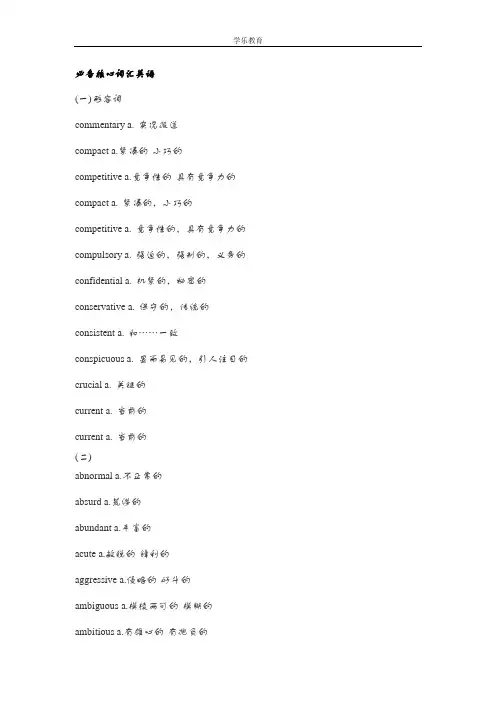
必备核心词汇英语(一)形容词commentary a. 实况报道compact a.紧凑的小巧的competitive a.竞争性的具有竞争力的compact a. 紧凑的,小巧的competitive a. 竞争性的,具有竞争力的compulsory a. 强迫的,强制的,义务的confidential a. 机紧的,秘密的conservative a. 保守的,传统的consistent a. 和……一致conspicuous a. 显而易见的,引人注目的crucial a. 关键的current a. 当前的current a. 当前的(二)abnormal a.不正常的absurd a.荒缪的abundant a.丰富的acute a.敏锐的锋利的aggressive a.侵略的好斗的ambiguous a.模棱两可的模糊的ambitious a.有雄心的有抱负的appropriate a.合适的恰当的authentic a.可靠的可信的average a.一般的普通的barren a.贫瘠的不毛的bound a.一定的chronic a.慢性的fatal a. 假的,冒充的fatal a. 致命的,毁灭性的feasible a. 可行的feeble a. 脆弱的,虚弱的decent a. 体面的,像样的,还不错的delicate a. 精细的,微妙的,精心处理的destructive a. 毁灭的economic a. 经济的elegant a. 优雅的,优美的,精致的embarrassing a. 令人尴尬的energetic a. 精力充沛的equivalent a. 相等的eternal a. 永恒的,无休止的exclusive a. 独有的,排他的extinct a. 灭绝的extinct a. 灭绝的,绝种的gloomy a. 暗淡的greasy a. 油腻的literal a. 文字的,字面的,逐字逐句的massive a. 大规模的,大量的merciful a. 仁慈的,宽大的mobile a. 活动的,流动的naive a. 言行自然而天真的,质朴的negligible a. 可忽略的,微不足道的notorious a. 臭名昭著的,声名狼藉的obedient a. 服从的,顺从的obscure a. 模糊不清的optimistic a. 乐观的original a. 原先的,最早的pathetic a. 悲哀的,悲惨的persistent a. 坚持不懈的potential a. 可能的,潜在的prent a. 普遍的,流行的primitive a. 原始的,早期的proficient a. 熟练的,精通的profound a. 深刻的,深远的prominent a. 突出的,杰出的prompt a. 即刻的,迅速的identical a. 相同的,一样的imaginative a. 富有想象力的,爱想象的inaccessible a. 可接近的,易使用的inadequate a. 不充分的,不适当的incredible a. 难以置信的indifference a. 不关心的,冷漠的indignant a. 生气的,愤怒的infectious a. 传染的,传染性的inferior a. 较次的,较劣的inferior a. 地位较低的,较差的inherent a. 固有的,生来的inspirational a. 灵感的intent a. 专心的,专注的intricate a. 复杂精细的intrinsic a. 固有的,本质的,内在的99-1-62 irreplaceable a. 不能替换的,不能代替的raw a. 自然状态的,未加工的relevant a. 与……有关的respectable a. 可尊敬的rewarding a. 值得的rough a. 粗略的,不精确的rude a. 粗鲁的,不礼貌的tedious a. 冗长的,乏味的trivial a. 琐碎的,不重要的turbulent a. 动荡的,混乱的underlying a. 潜在的versatile a. 多才多艺的vivid a. 生动的,栩栩如生的void a. 无效的vulnerable a. 易受伤的worth a. 值得sensitive a. 敏感的sheer a. 完全的,十足的shrewd a. 精明的stationary a. 固定的subordinate a. 次要的,从属的subtle a. 微妙的,精巧的,细微的superficial a. 肤浅的suspicious a. 对……怀疑(二)副词deliberately ad. 故意,有意地deliberately ad. 深思熟虑地,审慎地exclusively ad. 仅仅地explicitly ad. 明确地forcibly ad. 强行地,有力地formerly ad. 原先地,以前,从前increasingly ad. 日益,越来越多地inevitably ad. 必然地,不可避免地intentionally ad. 有意地,故意地optimistically ad. 乐观地outwardly ad. 表面上,外表上地presumably ad. 大概,可能,据推测simultaneously ad. 同时发生地somewhat ad. 颇为,稍稍,有几分spontaneously ad. 自发地,自然产生地startlingly ad. 惊人地triumphantly ad. (欣喜)胜利地,成功地unexpectedly ad. 意外地virtually ad. 事实上,实际地(三)名词Bisynes n. 商业;生意blame n. 责任blunder n. 错误,大错budget n. 预算caement n. 水泥capability n. 能力,才能cash n. 现金circulation n. (书报等的)发行量commitment n. 承诺,许诺compensation n. 补偿,赔偿consideration n. 考虑constitution n. 组成,构成consultant n. 顾问controversy n. 争论,辩论damage n. 损坏debate n. 争论,辩论denial n. 否认,否定,拒绝给与(正义,权利) diamaund n. 金刚石digest n. 摘要,简编dilemma n. 窘境,困境distinction n. 区分,辨别dyamaund n. 钻石access n. 入口,通路,接触accommodation n. 住宿,膳宿acknowledgement n. 承认,感谢,致谢admiration n. 欣赏advocate n. 提倡者,拥护者affrike n. 非洲allowance n. 津贴ambition n. 野心,雄心analogy n. 相似,模拟,类比anticipation n. 预期,期望appreciation n. 感谢,感激array n. 陈列,一系列assurance n. 保证emergency n. 紧急情况encouragement n. 鼓励eschaunge n. 交易所;交换essence n. 本质estimate n. 估计expenditure n. 开支extinction n .灭绝fashion n. 方式,样子finaunce n. 经济;财经flaw n. 裂纹,瑕疵fortune n. 财产,大笔的钱foteball n. 足球fraunce n. 法国fraction n. 小部分,一点fuse n. 保险丝guarantee n. 保修单guilt n. 犯罪harmony n. 与……协调一致,和谐hospitality n. 友好款待,好客humor n. 情绪,心境illusion n. 错觉,假象ingredient n. 成分insight n. 理解,洞察力inspection n. 检查,视察instinct n. 本能,直觉insuraunce n. 保险integrity n. 正直,诚实intuition n. 直觉intuition n. 直觉jadites n. 翡翠juelrye n. 珠宝lease n. 租约,契约legislation n. 立法,法律limitation n. 局限性,缺点loyalty n. 忠诚,忠心luxury n. 奢侈,豪华tanmaurk n. 丹麦temperament n. 气质,性格threshold n. 开端,入口tolerance n. 容忍,忍耐力transaction n. 处理,办理,交易transition n. 过渡,转变trend n. 倾向,趋势manifestation n. 表现(形式) mechanism n. 机械装置minority n. 少数misfortune n. 不幸,灾难morality n. 道德,美德notion n. 概念,观念,理解obligation n (法律上或道义上的)责任occasion n. 场合opponent n. 敌人,对手ornament n. 装饰,装饰品participation n. 参加,加入pastime n. 消遣,娱乐pattern n. 模式penalty n. 制裁,惩罚pension n. 养老金personality n. 人格,人性petrolaeum n. 石油pledge n. 保证,誓言position n. 位置,职位,职务predecessor n. 前任,原有的事物premise n. 前提,假设prescription n. 处方preservation n. 保护,防护prestige n. 威信,威望priority n. 优先(权)propretie n. 房产;财产prospect n. 前景,可能性rate n. 速度ration n. 比率recession n. (经济)衰退,不景气;撤退,退出reflection n. 反映,表现reputation n. 名声,声望reservation n. 贮存,贮藏reservation n. 预订revenue n. 税收,岁入rival n. 竞争对手routine n. 常规,惯例,例行公事scene n. 景色,景象scorn n. 轻蔑,鄙视secuerity n. 证券;安全shortage n. 短缺,不足smash n. 打碎,粉碎stability n. 稳定(性),稳固stack n. 堆,一堆standard n. 标准surface n. 表面wacche n. 手表variation n. 变化,变动warehouse n. 货仓(四)介词beyond prep. (在某方面)非……可及(五)动词abandon v. 抛弃,放弃acknowledge v. 对……表示谢忱,报偿acquaint v. 熟悉,认识acquire v. (靠自己的能力、努力或行为)获得,得到afford v. 付得起allege v. 断言,宣称alternate v. 交替,轮流anticipate v. 预期applaud v. 赞扬,称赞ascend v. 上升,攀登ascribe v. 归因于,归功于assemble v. 集合,聚集assign v. 分派,指派(职务,任务)attribute v. 归因于base v. 建立在……的基础上bewilder v. 迷惑,弄糊涂breed v. 培育,养育cling v. 坚守,抱紧coincide v. 相同,相一致collaborate v. 合著,合作collide v. 互撞,碰撞commence v. 开始compensate v. 补偿,赔偿complement v. 与……结合,补充comply v. 遵守conceive v. 想出,设想concern v. 涉及condense v. 压缩,浓缩conflict v. 冲突,战争conform v. 符合,遵守,适应confront v. 面对,面临conserve v. 保护,保存consolidate v. 巩固convey v. 表达,传达crash v. (飞机)坠毁cruise v. 航行,漫游dazzle v. 使眩目,耀眼deceive v. 欺骗,哄骗decline v. 下降,减少dedicate v. 奉献,献身,致力于defend v. 为……辩护defy v. 违抗,藐视deny v. 否认deprive v. 剥夺derive v. 得来,得到descend v. 下落descend v. 下来,下去deserve v. 值得deviate v. (使)背离,(使)偏离disguise v. 假扮,伪装dominate v. 统治,占据drain v. 渐渐耗尽duplicate v. 复制,重复eliminate v. 消除endure v. 忍受,忍耐enhance v. 提高,增加enhance v. 提高enroll v. 使成为……的成员,注册evoke v. 引起,唤起exclaim v. 呼喊,欢呼expire v. 到期,期满explore v. 探险,探索flap v. (鸟)振翅(飞行)follow v. 遵从furnish v. 配备,装饰gaze v. 凝视,注视gear v. 使适应,使适合grieve v. 使伤心,使悲伤hamper v. 妨碍,限制haul v. 拖,拉hinder v. 阻碍,妨害hoist v. 举起,升起,吊起identify v. 认出,确认ignite v. 引燃immerse v. 使浸没impose v. 把……强加于induce v. 劝诱,诱导deduceindulge v. 纵容,放任inhibitintend v. 意欲interpret v. 解释,说明jeopardize v. 危及,损坏linger v. 逗留,徘徊,留恋;迟缓,拖延locate v. 位于magnify v. 放大mean v. 打算,意欲mingle v. 混合起来,相混合minimize v. 对……做最低估计monitor v. 检测,监测neglect v. 忽视occupy v. 占领,使忙碌oppress v. 压迫originate v. 首创,起源overlap v. 部分重叠overwhelm v. 压倒,浸没,使不安parade v. 游行permeate v. 渗入,渗透perceiveprescribe v.preside v. 主持prolong v. 延长,拖延promise v. 许诺propel v. 推进,推动protest v. 抗议,反对provoke v. 引起,激起radiate v. 辐射状发出,从中心向各方伸展出reconcile v. 使和好,调解refresh v. 提神,使清新refute v. 证明……不对(是错误的),驳诉remain v. 停留,依旧是repel v. 抗御,抵拒rescue v. 营救,救援resign v. 辞职resort v. 求助,凭借,诉诸resume v. 重新开始,继续revenge v. 报仇,报复scan v. 细察,审视scrape v. 剥下,刮下scratch v. 抓,搔shrink v. 收缩,减少standardize v. 使标准化steer v. 驾驶,引导strengthen v. 加强,使更强壮stretch v. 伸展subscribe v. 预订,订阅suck v. (用嘴)吸,吞噬,卷入suppress v. 镇压sustain v. 承受tackle v. 解决,处理tempt v. 引诱,劝诱tempt v. 引诱,劝诱terminate v. 终止,结束transmit v. 传播,传递verify v. 证实,证明view v. 视为,看做wreck v. (船只)失事(六)短语adhere to 忠于after all 毕竟,归根结底at random 随机地,任意地break out 突然发生,爆发break up 打碎but for 要不是by far 最,……得多by no means 决不,一点也不catch on 理解,明白catch up with 赶上collide with 碰撞,冲突come up with 想出,提出come up with 追及,赶上comment on 评论contrary to 与……相反contribute to 有助于,促成cope with 应付,妥善处理cut short 打断,制止do away with 消灭,废除,去掉do credit to 为……带来光荣due to 因为go in for 从事,致力于go off 爆炸make sense of sth. 讲得通,言之有理of no avail 无用,无效on file 存档on no account 决不,绝对不on the decline 衰落中,衰退中out of stock 无现货的,脱销的provided that 假如,若是pull up 使停下put away 放好,放起来regardless of 不管,不顾result in 导致,结果是result in 发生,导致see to 照料,注意show to 引导,引领stand for 容忍,接受take on 承担,接受take over 接管,接收95take to 对……产生好感,开始喜欢talk into 说服turn to 求助于ward off 防止,避开with reference to 关于,有关work out 想出,制订出worth one’s while 值得hang by a thread 千钧一发,岌岌可危heap praise upon 对……大加称赞in accordance with 与……一致,按照,根据in between 在两者之间in case of 防备,以防in honour of 为纪念in response to 响应,反应in terms of 根据,从……方面来说in that 因为in the vicinity of 在附近00-6-48keep off 远离,抑制lay off (暂时)解雇let alone 更不必说look into 调查look on 看待lose no time 立即。
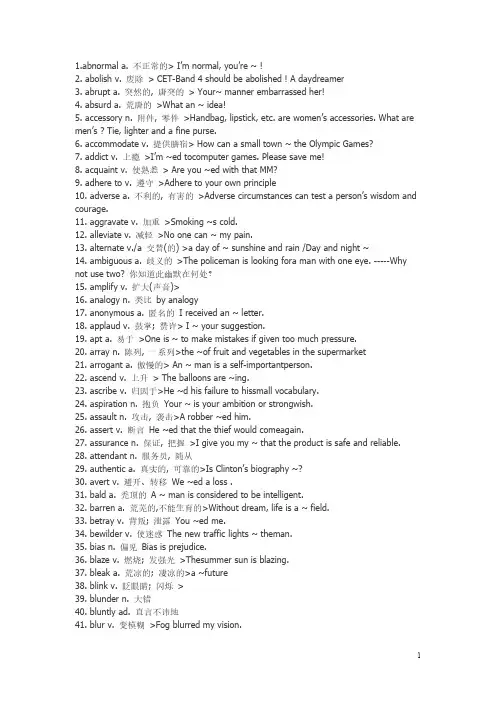
1.abnormal a. 不正常的> I’m normal, you’re ~ !2. abolish v. 废除> CET-Band 4 should be abolished ! A daydreamer3. abrupt a. 突然的, 唐突的> Your~ manner embarrassed her!4. absurd a. 荒唐的>What an ~ idea!5. accessory n. 附件, 零件>Handbag, lipstick, etc. are women’s accessories. What are men’s ? Tie, lighter and a fine purse.6. accommodate v. 提供膳宿> How can a small town ~ the Olympic Games?7. addict v. 上瘾>I’m ~ed tocomputer games. Please save me!8. acquaint v. 使熟悉> Are you ~ed with that MM?9. adhere to v. 遵守>Adhere to your own principle10. adverse a. 不利的, 有害的>Adverse circumstances can test a person’s wisdom and courage.11. aggravate v. 加重>Smoking ~s cold.12. alleviate v. 减轻>No one can ~ my pain.13. alternate v./a 交替(的) >a day of ~ sunshine and rain /Day and night ~14. ambiguous a. 歧义的>The policeman is looking fora man with one eye. -----Why not use two? 你知道此幽默在何处?15. amplify v. 扩大(声音)>16. analogy n. 类比by analogy17. anonymous a. 匿名的I received an ~ letter.18. applaud v. 鼓掌; 赞许> I ~ your suggestion.19. apt a. 易于>One is ~ to make mistakes if given too much pressure.20. array n. 陈列, 一系列>the ~of fruit and vegetables in the supermarket21. arrogant a. 傲慢的> An ~ man is a self-importantperson.22. ascend v. 上升> The balloons are ~ing.23. ascribe v. 归因于>He ~d his failure to hissmall vocabulary.24. aspiration n. 抱负Your ~ is your ambition or strongwish.25. assault n. 攻击, 袭击>A robber ~ed him.26. assert v. 断言He ~ed that the thief would comeagain.27. assurance n. 保证, 把握>I give you my ~ that the product is safe and reliable.28. attendant n. 服务员, 随从29. authentic a. 真实的, 可靠的>Is Clinton’s biography ~?30. avert v. 避开、转移We ~ed a loss .31. bald a. 秃顶的A ~ man is considered to be intelligent.32. barren a. 荒芜的,不能生育的>Without dream, life is a ~ field.33. betray v. 背叛; 泄露You ~ed me.34. bewilder v. 使迷惑The new traffic lights ~ theman.35. bias n. 偏见Bias is prejudice.36. blaze v. 燃烧; 发强光>Thesummer sun is blazing.37. bleak a. 荒凉的; 凄凉的>a ~future38. blink v. 眨眼睛; 闪烁>39. blunder n. 大错40. bluntly ad. 直言不讳地41. blur v. 变模糊>Fog blurred my vision.42. bribe v. 行贿>Who bribed the bride? Bridegroom.43. browse v. 浏览~ a web-page44. brutal a. 残酷的=cruel/savage/45. capsule n. 密封仓, 胶囊46. carve v. 刻47. casualty n. 伤亡人员Many casualties are reported inthe battle.48. cater to v. 迎合> cater to the consumers49. caution n. 小心50. cherish v. 珍视; 怀有>~friendship/~ the hope that51. chronic a. 慢性的;严重的52. circulation n. 循环; 发行(量)>Reader has the largest ~ in China.53. climax n. 高潮the ~ of the play54. cling to v. 紧紧抓住,依恋;坚持,墨守>The baby clung to his mother./ ~ to the hope that....55. coincidence n. 巧合56. collaboration n. 合作in ~ with57. collide v. 相撞; 冲突The two opinions ~ with each other.58. commence v. 开始59. commute v. 乘车上下班>I have to ~ between theuniversity town and the downtown area.60. compact a. 紧凑的, 结实的a ~ car/office61. compatible a. 相容的; 兼容的>That husband and wife are very ~.62. compensate v. 赔偿>The insurance company ~d theman for his injuries.63. compile v. 汇编, 编辑~ a encyclopedia64. complement v. 补充,与。
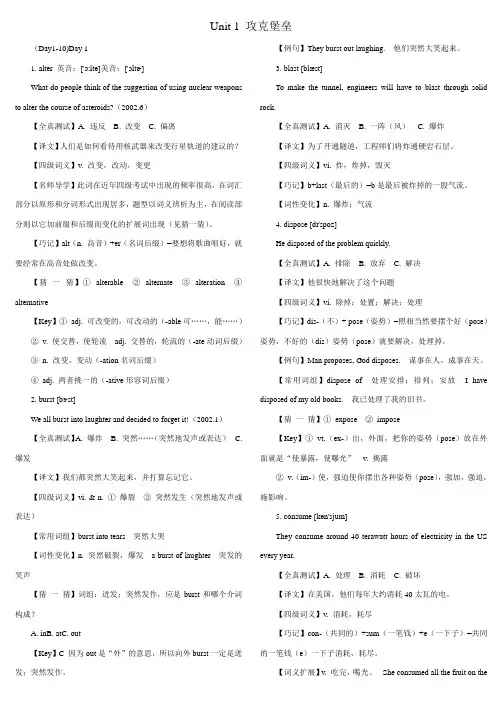
Unit 1 攻克堡垒(Day1-10)Day 11. alter 英音:['ɔ:ltə]美音:['ɔltɚ]What do people think of the suggestion of using nuclear weapons to alter the course of asteroi ds?(2002.6)【全真测试】A. 违反 B. 改变 C. 偏离【译文】人们是如何看待用核武器来改变行星轨道的建议的?【四级词义】v. 改变,改动,变更【名师导学】此词在近年四级考试中出现的频率很高,在词汇部分以原形和分词形式出现居多,题型以词义辨析为主,在阅读部分则以它加前缀和后缀而变化的扩展词出现(见猜一猜)。
【巧记】alt(n. 高音)+er(名词后缀)=要想将歌曲唱好,就要经常在高音处做改变。
【猜一猜】①alterable ②alternate ③alteration ④alternative【Key】①adj. 可改变的,可改动的(-able可……,能……)②v. 使交替,使轮流adj. 交替的,轮流的(-ate动词后缀)③n. 改变,变动(-ation名词后缀)④adj. 两者挑一的(-ative形容词后缀)2. burst [bɝst]We all burst into laughter and decided to forget it!(2002.1)【全真测试】A. 爆炸 B. 突然……(突然地发声或表达) C. 爆发【译文】我们都突然大笑起来,并打算忘记它。
【四级词义】vi. & n. ①爆裂②突然发生(突然地发声或表达)【常用词组】burst into tears 突然大哭【词性变化】n. 突然破裂,爆发 a burst of laughter 突发的笑声【猜一猜】词组:迸发;突然发作,应是burst和哪个介词构成?A. inB. atC. out【Key】C 因为out是“外”的意思,所以向外burst一定是迸发;突然发作。
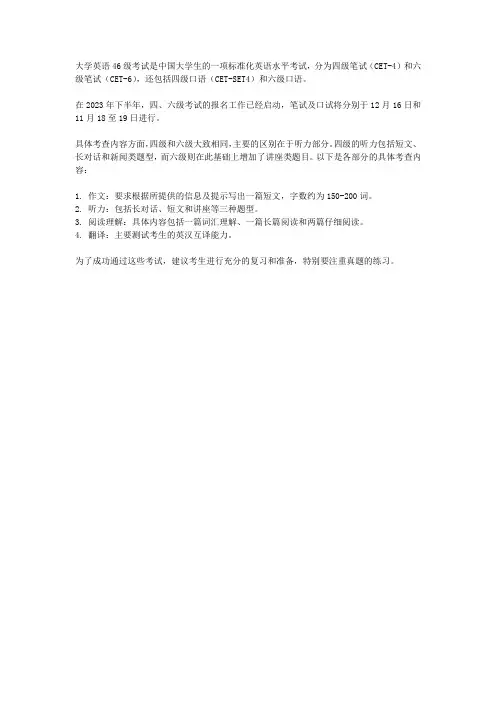
大学英语46级考试是中国大学生的一项标准化英语水平考试,分为四级笔试(CET-4)和六级笔试(CET-6),还包括四级口语(CET-SET4)和六级口语。
在2023年下半年,四、六级考试的报名工作已经启动,笔试及口试将分别于12月16日和11月18至19日进行。
具体考查内容方面,四级和六级大致相同,主要的区别在于听力部分。
四级的听力包括短文、长对话和新闻类题型,而六级则在此基础上增加了讲座类题目。
以下是各部分的具体考查内容:
1. 作文:要求根据所提供的信息及提示写出一篇短文,字数约为150-200词。
2. 听力:包括长对话、短文和讲座等三种题型。
3. 阅读理解:具体内容包括一篇词汇理解、一篇长篇阅读和两篇仔细阅读。
4. 翻译:主要测试考生的英汉互译能力。
为了成功通过这些考试,建议考生进行充分的复习和准备,特别要注重真题的练习。
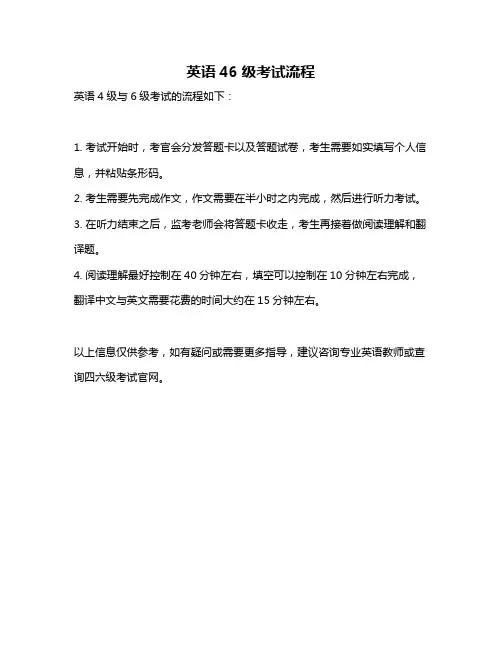
英语46级考试流程
英语4级与6级考试的流程如下:
1. 考试开始时,考官会分发答题卡以及答题试卷,考生需要如实填写个人信息,并粘贴条形码。
2. 考生需要先完成作文,作文需要在半小时之内完成,然后进行听力考试。
3. 在听力结束之后,监考老师会将答题卡收走,考生再接着做阅读理解和翻译题。
4. 阅读理解最好控制在40分钟左右,填空可以控制在10分钟左右完成,翻译中文与英文需要花费的时间大约在15分钟左右。
以上信息仅供参考,如有疑问或需要更多指导,建议咨询专业英语教师或查询四六级考试官网。
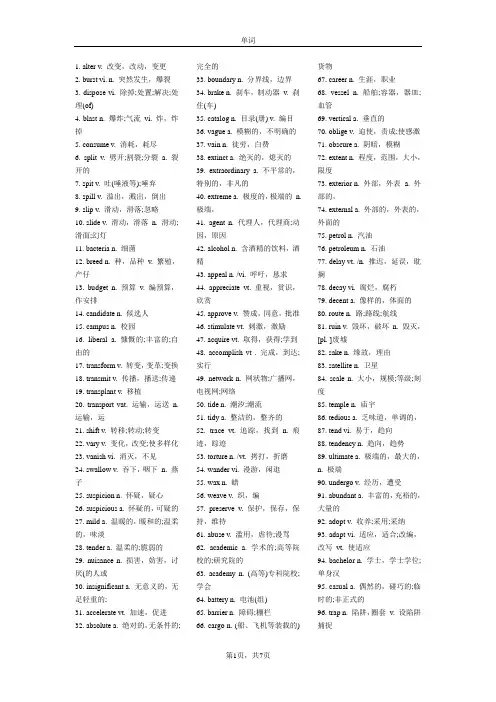
1. alter v. 改变,改动,变更2. burst vi. n. 突然发生,爆裂3. dispose vi. 除掉;处置;解决;处理(of)4. blast n. 爆炸;气流vi. 炸,炸掉5. consume v. 消耗,耗尽6. split v. 劈开;割裂;分裂a. 裂开的7. spit v. 吐(唾液等);唾弃8. spill v. 溢出,溅出,倒出9. slip v. 滑动,滑落;忽略10. slide v. 滑动,滑落n. 滑动;滑面;幻灯11. bacteria n. 细菌12. breed n. 种,品种v. 繁殖,产仔13. budget n. 预算v. 编预算,作安排14. candidate n. 候选人15. campus n. 校园16. liberal a. 慷慨的;丰富的;自由的17. transform v. 转变,变革;变换18. transmit v. 传播,播送;传递19. transplant v. 移植20. transport vat. 运输,运送n. 运输,运21. shift v. 转移;转动;转变22. vary v. 变化,改变;使多样化23. vanish vi. 消灭,不见24. swallow v. 吞下,咽下n. 燕子25. suspicion n. 怀疑,疑心26. suspicious a. 怀疑的,可疑的27. mild a. 温暖的,暖和的;温柔的,味淡28. tender a. 温柔的;脆弱的29. nuisance n. 损害,妨害,讨厌(的人或30. insignificant a. 无意义的,无足轻重的;31. accelerate vt. 加速,促进32. absolute a. 绝对的,无条件的;完全的33. boundary n. 分界线,边界34. brake n. 刹车,制动器v. 刹住(车)35. catalog n. 目录(册) v. 编目36. vague a. 模糊的,不明确的37. vain n. 徒劳,白费38. extinct a. 绝灭的,熄灭的39. extraordinary a. 不平常的,特别的,非凡的40. extreme a. 极度的,极端的n.极端,41. agent n. 代理人,代理商;动因,原因42. alcohol n. 含酒精的饮料,酒精43. appeal n. /vi. 呼吁,恳求44. appreciate vt. 重视,赏识,欣赏45. approve v. 赞成,同意,批准46. stimulate vt. 刺激,激励47. acquire vt. 取得,获得;学到48. accomplish vt . 完成,到达;实行49. network n. 网状物;广播网,电视网;网络50. tide n. 潮汐;潮流51. tidy a. 整洁的,整齐的52. trace vt. 追踪,找到n. 痕迹,踪迹53. torture n. /vt. 拷打,折磨54. wander vi. 漫游,闲逛55. wax n. 蜡56. weave v. 织,编57. preserve v. 保护,保存,保持,维持61. abuse v. 滥用,虐待;谩骂62. academic a. 学术的;高等院校的;研究院的63. academy n. (高等)专科院校;学会64. battery n. 电池(组)65. barrier n. 障碍;棚栏66. cargo n. (船、飞机等装载的)货物67. career n. 生涯,职业68. vessel n. 船舶;容器,器皿;血管69. vertical a. 垂直的70. oblige v. 迫使,责成;使感激71. obscure a. 阴暗,模糊72. extent n. 程度,范围,大小,限度73. exterior n. 外部,外表a. 外部的,74. external a. 外部的,外表的,外面的75. petrol n. 汽油76. petroleum n. 石油77. delay vt. /n. 推迟,延误,耽搁78. decay vi. 腐烂,腐朽79. decent a. 像样的,体面的80. route n. 路;路线;航线81. ruin v. 毁坏,破坏n. 毁灭,[pl. ]废墟82. sake n. 缘故,理由83. satellite n. 卫星84. scale n. 大小,规模;等级;刻度85. temple n. 庙宇86. tedious a. 乏味道,单调的,87. tend vi. 易于,趋向88. tendency n. 趋向,趋势89. ultimate a. 极端的,最大的,n. 极端90. undergo v. 经历,遭受91. abundant a. 丰富的,充裕的,大量的92. adopt v. 收养;采用;采纳93. adapt vi. 适应,适合;改编,改写vt. 使适应94. bachelor n. 学士,学士学位;单身汉95. casual a. 偶然的,碰巧的;临时的;非正式的96. trap n. 陷阱,圈套v. 设陷阱捕捉97. vacant a. 空的,未占用的98. vacuum n. 真空,真空吸尘器99. oral a. 口头的,口述的,口的100. optics n. (单、复数同形)光学101. organ n. 器官,风琴102. excess n. 过分,过量,过剩103. expel v. 驱逐,开除,赶出104. expend v. 消费105. expenditure n. 支出,消费;经费106. expense n. 开销,费用107. expensive a. 花钱多的;价格高贵的108. expand v. 扩大,扩张;展开,膨胀109. expansion n. 扩大,扩充;发展,膨胀110. private a. 私人的,个人的111. individual a. 个别的,单独的n. 个人,个体112. personal a. 个人的,私人的;亲自的114. personnel n. [总称] 人员,员工;人事部门115. the Pacific Ocean 太平洋116. the Atlantic Ocean 大西洋117. the Arctic Ocean 北冰洋118. the Antarctic Ocean 南冰洋119. grant vt. 授予,同意,准予119. grand a. 宏伟大,壮丽的,重大的120. invade v. 侵入,侵略,侵袭121. acid n. 酸,酸性物质a. 酸的;尖刻的122. acknowledge v. 承认;致谢123. balcony n. 阳台124. calculate vt. 计算,核算125. calendar n. 日历,月历126. optimistic a. 乐观127. optional a. 可以任选的,非强制的128. outstanding a. 杰出的,突出的,显著129. export n. 出口(物) v. 出口,输出130. import n. 进口(物) v. 进口,输入131. impose vt. 把. . . 加强(on);采用,利用132. religion n. 宗教,宗教信仰133. religious a. 宗教的134. victim n. 牺牲品,受害者135. video n. 电视,视频a. 电视的,录像的136. videotape n. 录像磁带v.把. . . 录在录像带上137. offend v. 冒犯,触犯138. bother v. 打搅,麻烦139. interfere v. 干涉,干扰,妨碍140. internal a. 内部的,国内的141. beforehand ad. 预先,事先142. racial a. 人种的种族的143. radiation n. 放射物,辐射144. radical a. 根本的;激进的145. range n. 幅度,范围v. (在某范围内)变动146. wonder n. 惊奇,奇迹v. 想知道,对. . . 感到疑惑147. isolate vt. 使隔离,使孤立148. issue n. 问题,争论点;发行,(报刊)一期149. hollow a. 空的,中空的,空虚道150. hook n. 钩vt. 钩住151. adequate a. 适当地;足够152. adhere vi. 粘附,附着;遵守,坚持153. ban vt. 取缔,禁止154. capture vt. 俘虏,捕获155. valid a. 有效的,有根据的;正当的156. valley n. 山谷,峡谷157. consistent a. 坚固定;一致的,始终如一的158. continuous a. 继续的,连续(不断)的159. continual a. 不断地,频繁的160. explode v. 爆炸;爆发;激增161. exploit v. 剥削;利用,开采162. explore v. 勘探163. explosion n. 爆炸;爆发;激增164. explosive a. 爆炸的;极易引起争论的165. remote a. 遥远的,偏僻的166. removal n. 除去,消除167. render vt. 使得,致使167. render 解释比较长,可要仔细体会啊!168. precaution n. 预防,防备,警惕169. idle a. 懒散的,无所事事的170. identify vt. 认出,鉴定171. identify n. 身份;个性,特性172. poverty n. 贫穷173. resistant a. (to) 抵抗的,抗. . . 的,耐. . . 的174. resolve vt. 解决;决定,决意175. barrel n. 桶176. bargain n. 便宜货vi. 讨价还价177. coarse a. 粗的,粗糙的,粗劣的178. coach n. 教练;长途公共汽车179. code n. 准则,法规,密码180. coil n. 线圈v. 卷,盘绕181. adult n. 成年人182. advertise v. 为. . . 做广告183. advertisement n. 广告184. agency n. 代理商,经销商185. focus v. (使)聚集n. 焦点,中心,聚焦186. forbid vt. 不许,禁止187. debate n. /v. 辩论,争论188. debt n. 欠债189. decade n. 十年190. enclose vt. 围住;把. . . 装入信封191. encounter vt. /n. 遭遇,遭到192. globe n. 地球,世界;地球仪193. global a. 全球的;总的194. scan vt. 细看;扫描;浏览195. scandal n. 丑事,丑闻196. significance n. 意义;重要性197. subsequent a. 随后的,后来的198. virtue n. 美德,优点199. virtual a. 实际上的,事实上的200. orient vt. 使适应,(to, toward)使朝向n. 东方201.portion n.一部分202.target n.目标,靶子vt.瞄准203.portable a.手提式的204.decline v.拒绝,谢绝;下降205.illusion n.错觉206.likelihood n.可能,可能性207.stripe n.条纹208.emphasize v t.强调,着重209.emotion n.情感,感情210.emotional a.感情的,情绪(上)的211.awful a.极坏的,威严的,可怕的212.awkward a.笨拙的,棘手的213.clue n.线索,提示214.collision n.碰撞,冲突215.device n.装置,设备216.devise v t.发明,策划,想出217.inevitable a.不可避免的218.naval a.海军的219.navigation n.航行220.necessity n.必需品;必要性221.previous a.先,前,以前的222.provision n.[pl.]给养,口粮;准备,设备,装置223.pursue vt.追逐;追求;从事,进行224.stale a.不新鲜的,陈腐的225.substitute n.代用品vt.代替226.deserve vt.应受,应得,值得227.discrimination n.歧视;辨别力228.professional a.职业的,专门的229.secure a.安全的,可靠的230.security n.安全,保障231.scratch v./n.抓,搔,扒232.talent n.才能,天资;人才233.insurance n.保险,保险费234.insure vt.给...保险,保证,确保235.nevertheless ad.仍然,然而,不过236.neutral a.中立的,中性的237.spot n.地点;斑点vt.认出,发现;玷污238.spray v.喷,(使)溅散239.medium a.中等的,适中的n.媒介物,新闻媒介240.media n.新闻传媒241.auxiliary a.辅助的,备用的242.automatic a.自动的pete vi.竞争,比赛petent a.有能力的,能胜任的petition n.竞争,比赛246.distribute vt.分发247.disturb vt.打搅,妨碍248.infer v.推论,推断249.integrate v.(into,with)(使)成为一体,(使)合并250.moist a.潮湿来源:考试大-英语四级考试251.moisture n.潮湿252.promote v t.促进;提升253.region n.地区;范围;幅度254.register v./n.登记,注册255.stable a.稳定的256.sophisticated a.老于世故的,老练的;很复杂的257.splendid a.极好的,壮丽的,辉煌的258.cancel vt.取消,废除259.variable a.易变的,可变的260.prospect n.前景,前途;景象261.prosperity n.兴旺,繁荣262.aspect n.方面;朝向;面貌263.cope vi.(with)(成功地)应付,处理264.core n.果心,核心265.maintain vt.维持,保持;坚持,主张266.mainland n.大陆267.discipline n.纪律;惩罚;学科268.domestic a.本国的,国内的;家用的;家庭的269.constant a.不变的,恒定的n.常数270.cliff n.悬崖,峭壁271.authority n.权威;当局272.audio a.听觉273.attitude n.态度munity n.社区,社会mit vt.犯(错误,罪行等),干(坏事等)ment n./vt.评论277.distinguish vt.区分,辨别278.distress n.痛苦,悲伤vt.使痛苦279.facility n.[pl.]设备,设施;便利,方便280.faculty n.能力,技能;系,学科,学院;全体教员281.mixture n.混合,混合物282.mood n.心情,情绪;语气283.moral a.道德上的,有道德的284.prominent a.突出的285.substance n.物质;实质286.substantial a.可观的;牢固的;实质的287.prompt vt.促使a.敏捷的,及时的288.vivid a.生动的289.vocabulary n.词汇(量);词汇表290.venture n.风险投资,风险项目v.冒险;取于291.version n.版本,译本;说法292.waist n.腰,腰部293.weld v./n.焊接294.yawn vi.打哈欠295.yield vi.(to)屈服于;让出,放弃n.产量296.zone n.地区,区域297.strategy n.战略,策略298.strategic a.战略(上)的,关键的299.tense a.紧张的v.拉紧n.时态300.tension n.紧张(状态),张力301.avenue n.林荫道,大街302.available a.现成可用的;可得到的parable a.(with,to)可比较的,类似的parative a.比较的,相对的305.dash vi.猛冲,飞奔306.data n.数据,资料307.dive vi.跳水,潜水308.diverse a.不同的,多种多样的309.entitle vt.给...权利,给...资格310.regulate vt.管理,调节311.release vt./n.释放,排放;解释解脱312.exaggerate v.夸大,夸张313.evil a.邪恶的,坏的314.shrink vi.起皱,收缩;退缩315.subtract v.减(去)316.suburb n.市郊317.subway n.地铁318.survey n./vt.调查,勘测319.wealthy a.富裕的320.adjust v.调整,调节321.attach vt.系,贴;使附属322.profit n.利润,益处;v.有益于,有利于323.profitable a.有利可图的324.slope n.斜坡,斜面325.reinforce vt.增强,加强326.reject vt.拒绝327.fatal a.致命的;重大的328.fate n.命运329.humble a.谦逊的;谦虚的330.illegal a.不合法的,非法的331.award vt.授予,判给n.奖品,奖金332.aware a.意识到333.column n.柱,圆柱;栏,专栏edy n.喜剧335.dumb a.哑的;沉默的336.dump vt.倾卸,倾倒337.deaf a.聋的;不愿听的338.decorate vt.装饰,装璜339.principal a.最重要的n.负责人,校长340.principle n.原则,原理341.prior a.优先的,在前的342.priority n.优先,重点343.prohibit vt.禁止,不准344.remarkable a.值得注意的,异常的,非凡的345.remedy n./vt.补救,医治,治疗346.repetition n.重复,反复347.vain a.徒劳的,无效的348.undertakev t.承担,着手做;同意,答应349.unique a.唯一的,独特的350.obstacle n.障碍(物),妨碍351.odd a.奇特的,古怪的;奇数的352.omit vt.省略353.opponent n.敌手,对手354.opportunity n.机会,时机355.orchestra n.管弦乐队356.semester n.学期;半年357.semiconductor n.半导体358.seminar n.研讨会359.terminal a.末端的,极限的n.终点360.territory n.领土361.approximate a.大概的,大约v.近似362.arbitrary a.随意的,未断的363.architect n.建筑师364.architecture n.建筑学365.biology n.生物学366.geography n.地理(学)367.geology n.地质学368.geometry n.几何(学)369.arithmetic n.算术370.algebra n.代数371.entertainment n.娱乐;招待,款待372.enthusiasm n.热情,热心373.entry n.进入,入口处;参赛的人(或物)374.environment n.环境375.episode n.插曲,片段376.equation n.方程(式)377.restrain vt.阻止,抑制378.restraint n.抑制,限制379.resume v.(中断后)重新开始380.severe a.严重的381.sexual a.性的382.simplicity n.简单;朴素383.simplify vt.简化384.sorrow n.悲哀,悲痛385.stuff n.原料,材料vt.填进,塞满386.temporary a.暂时的,临时的387.temptation n.诱惑,引诱388.terror n.恐怖389.thrust v.挤,推,插390.treaty n.条约,协定391.arise vi.产生,出现,发生;起身392.arouse vt.引起,激起;唤醒393.burden n.重担,负荷394.bureau n.局,办事处395.marvelous a.奇迹般的,惊人的396.massive a.大的,大量的,大块的397.mature a.成熟的398.maximum a.最高的,最大的399.minimum a.最低的,最小的400.nonsense n.胡说,冒失的行动402. nucleus n. 核403. retail n. /v. /ad. 零售404. retain vt. 保留,保持405. restrict vt. 限制,约束406. sponsor n. 发起者,主办者vt. 发起,主办,资助407. spur n. /vt. 刺激,激励408. triumph n. 胜利,成功409. tuition n. 学费410. twist vt. 使缠绕;转动;扭歪411. undergraduate n. 大学肄业生412. universal a. 普遍的,通用的;宇宙的413. universe n. 宇宙414. via prep. 经由,经过,通过415. vibrate v. 振动,摇摆416. virus n. 病毒417. voluntary a. 自愿的418. volunteer n. 志愿者v. 自愿(做)419. vote v. 选举n. 选票420. wagon n. 四轮马车,铁路货车421. appoint vt. 任命,委派422. approach v. 靠近,接近n. 途径,方式423. appropriate a. 适当的424. bunch n. 群,伙;束,串425. bundle n. 捆,包,束vt. 收集,归拢426. ceremony n. 典礼,仪式427. chaos n. 混乱,紊乱428. discount n. (价格)折扣429. display n. /vt. 陈列,展览430. equivalent a. 相等的a. 相等物431. erect a. 竖直的v. 建造,竖立432. fax n. /vt. 传真433. fertile a. 肥沃的;多产的434. fertilizer n. 肥料435. grateful a. 感激的436. gratitude n. 感激437. horror n. 恐怖438. horrible a. 可怕的439. Internet n. 国际互联网,因特网440. interpret v. 翻译,解释441. interpretation n. 解释,说明442. jungle n. 丛林,密林443. knot n. 结vt. 把. . . 打成结444. leak v. 漏,渗出445. lean vi. 倾斜,倚,靠446. leap vi. 跳跃447. modify vt. 修改448. nylon n. 尼龙449. onion n. 洋葱450. powder n. 粉末451.applicable a. 可应用的,适当的452. applicant n. 申请人453. breadth n. 宽度454. conservation n. 保存,保护455. conservative a. 保守的456. parallel n. 平行线;可相比拟的事物457. passion n. 激情,热情458. passive a. 被动的,消极的459. pat v. /n. 轻拍,轻打460. peak n. 山峰,顶点461. phenomenon n. 现象462. reluctant a. 不情愿的,勉强的463. rely vi. (on ,upon)依赖,指望464. relevant a. 有关的,切题的465. reliable a. 可靠的466. relief n. 轻松,宽慰;减轻467. reputation n. 名气,声誉468. rescue vt. /n. 营救469. triangle n. 三角(形)470. sequence n. 连续;顺序471. shallow a. 浅的472. shiver vi/n. 发抖473. shrug v. /n. 耸肩474. signature n. 签名475. sincere a. 诚挚的,真诚的476. utility n. 功用,效用477. utilize vt. 利用478. utter vt. 说出a. 完全的,彻底的479. variation n. 变化,变动480. vehicle n. 交通工具,车辆481. applause n. 鼓掌,掌声482. appliance n. 器具,器械483. consent n. 准许,同意vi (to)准许,同意484. conquer vt. 征服485. defect n. 缺点,缺陷486. delicate a. 易碎的;娇弱的;精美的487. evolve v. 演变488. evolution n. 演变,进化489. frown v. /n. 皱眉490. frustrate vt. 使沮丧491. guarantee vt. /n. 保证492. guilty a. 内疚的;有罪的493. jealous a. 妒忌的494. jeans n. 牛仔裤495. liquor n. 酒,烈性酒496. liter/litre n. 升497. modest a. 谦虚道498. molecule n. 分子499. orbit n. 轨道v. (绕. . . )作轨道运行500. participate v. (in) 参与,参加501. particle n. 微粒502. particularly ad. 特别,尤其503. respond vi. 回答,答复;反应504. response n. 回答,答复;反应505. sensible a. 明智的506. sensitive a. 敏感到,灵敏的507. tremble vi. 颤抖508. tremendous a. 巨大的;精彩的509. trend n. 趋向,倾向510. trial n. 审讯;试验511. apparent a. 显然的,明白的512. appetite n. 胃口;欲望513. deposit n. 存款,定金v. 存放,储蓄514. deputy n. 副职,代表515. derive vt. 取得,得到;(from)起源于516. descend v. 下来,下降517. missile n. 导弹518. mission n. 使命;代表团519. mist n. 薄雾520. noticeable a. 显而易见到521. notify vt. 通知,告知522. notion n. 概念;意图,想法523. resemble vt. 像,类似于524. reveal vt. 揭露525. revenue n. 收入,岁入;税收526. shelter n. 掩蔽处;住所527. shield n. 防护物,盾vt. 保护,防护528. vital a. 重要的;致命的,生命的529. vitally ad. 极度,非常;致命地530. urban a. 城市的531. urge vt. 鼓励,激励532. urgent a. 急迫的,紧急得533. usage n. 使用,用法534. violence n. 强力,暴力535. violent a. ****的536. violet a. 紫色的537. weed n. 杂草,野草538. welfare n. 福利539. whatsoever ad. (用于否定句)任何540. whereas conj. 然而,但是,尽管541. essential a. 必不可少的;本质的542. estimate n. /vt. 估计,估量543. evaluate vt. 评估,评价544. exceed vt. 超过,越出545. exceedingly ad. 非常,极其546. exclaim v. 呼喊,大声说547. exclude vt. 把. . . 排斥在外,不包括548. exclusive a. 读有的,排他的549. excursion n. 远足550. flash vi. 闪光,闪耀551. flee vi. 逃走552. flexible a. 易弯曲的553. flock n. 羊群,(鸟兽等)一群;一伙人554. hardware n. 五金器具555. harmony n. 和谐,融洽556. haste n. 急速,急忙557. hatred n. 憎恶,憎恨558. incident n. 事件,事变559. index n. 索引,标志560. infant n. 婴儿561. infect v. 传染562. inferior a. 劣等的,次的,下级的563. infinite a. 无限的564. ingredient n. 组成部分565. inhabitant n. 居民566. jail n. 监狱567. jam n. 果酱;拥挤,堵塞568. jewel n. 宝石569. joint a. 连接的;共同的570. junior a. 年少的;资历较浅的571. laser n. 激光572. launch vt. 发动,发起573. luxury n. 奢侈; 奢侈品574. magnet n. 磁铁,磁体575. male a. 男性的,雄的576. female a. 女性的,雌的577. manual a. 用手的,手工做的n. 手册578. manufacture vt. /n. 制造,加工579. marine a. 海的;海产的580. mutual a. 相互的581. naked a. 裸露的582. negative a. 否定的,消极的583. neglect vt. 忽视,忽略584. origin n. 起源,出身585. oval a. 椭圆形的n. 椭圆形586. outset n. 开始,开端587. presumably ad. 大概,可能588. prevail vi. 流行,盛行589. quit v. 停止590. quotation n. 引文,引语591. recreation n. 娱乐活动592. recruit vt. 招募,吸收(新成员)593. rival n. 竞争对手,敌手594. shuttle n. 梭子; 航天飞机595. skim vt. 搬(去),掠过;浏览596. sketch n. 草图;梗概597. slender a. 苗条的,修长的598. theme n. 主题599. textile n. 纺织品600. tropical a. 热情的,炎热的601. kneel vi. 跪602. label n. 标签603. merchant n. 商人604. mere a. 仅仅的,只不过的;纯粹的605. nuisance n. 令人讨厌的东西(或人)606. numerous a. 众多的,许多的607. parade n. 游行v. 列队行进608. pants [pl. ] n. 长裤;内裤609. partial a. 部分的610. passport n. 护照611. prescribe vt. 开药,吩咐采用. . . 疗法612. primitive a. 原始的,早期的613. ridge n. 脊,山脊,埂614. ridiculous a. 可笑的,荒漠的615. redid a. 严格的;僵硬的616. withstand vt. 经受,承受617. witness n. 目击者;证据vt.注意到;证明618. withdraw v. 收回,撤销619. slippery a. 滑的620. smash vt. 粉碎,打烂621. snap n. /vt. 折断,拉断;快照622. software n. 软件623. solar a. 太阳的624. lunar a. 月的,月球的625. submerge vi. 潜入水中626. submit vi. (to)屈服,听从627. timber n. 木材,原木628. tissue n. 组织;薄纱,手巾纸629. title n. 题目,标题630. tone n. 语气,音调631. drift vi. 漂,漂流632. drip n. 滴633. durable a. 耐用的,持久的634. duration n. 持续,持续期间635. dusk n. 黄昏,薄暮636. leather n. 皮革637. legislation n. 法律,法规;立法638. leisure n. 闲暇;悠闲639. loose a. 松的,宽松的640. loosen v. 解开,放松641. tannest a. 认真的,诚挚的642. earthquake n. 地震643. echo n. 回音,回声644. elaborate a. 精心设计的,复杂的645. elastic n. 橡皮圈(带) a. 有弹性的646. elbow n. 肘647. electron n. 电子648. volcano n. 火山649. volume n. 卷,册;体积,容量650. fatigue n. 疲劳,劳累651. faulty a. 有错误的,有缺点的652. favorable a. 称赞道;有利的,顺利的653. favorite a. 特别受喜欢的n. 喜爱的人或物654. gallery n. 画廊655. gallon n. 加仑656. gap n. 间隔,差距657. garbage n. 垃圾,废物658. gaze v. 凝视,注视659. gear n. 齿轮,传动装置660. gene n. 基因661. lest conj. 唯恐,免得662. liable a. 可能的,大概的; (to) 易于. . .663. liberal a. 自由得664. liberty n. 自由665. license/license n. 许可证,执照666. moisture n. 潮湿667. motivate vt. 激励,激发668. motive n. 动机,目的669. generate vt. 生成,产生(光、热、电等)670. genius n. 天才,天赋671. genuine a. 真的,真诚的672. gasoline n. 汽油673. germ n. 微生物,细菌674. gesture n. 姿势,手势675. giant a. 巨大的n. 巨人,巨物676. glimpse n. 一瞥,一看677. glory n. 光荣,荣誉678. glorious n. 光荣的,极好的679. golf n. 高尔夫球运动680. hydrogen n. 氢681. oxygen n. 氧682. hostile a. 敌对的,敌意大683. household n. 家庭,户684. hook n. 钩685. holy a. 神圣地,圣洁的686. hint n. 暗示,示意687. hesitate v. 犹豫688. highlight vt. 强调,突出689. hence ad. 因此,所以;今后,从此690. herd n. 兽群,牧群691. deliberately adv. 故意的692. attraction n. 吸引,吸引力693. destructive adj. 破坏性的694. starvation n. 饥饿,饿死695. exhaustion n. 竭力,疲惫696. strike n. 罢工v. 打击,罢工697. strength n. 力量,力气698. await vt. 等候699. deportation n. 放逐700. closed 关门。
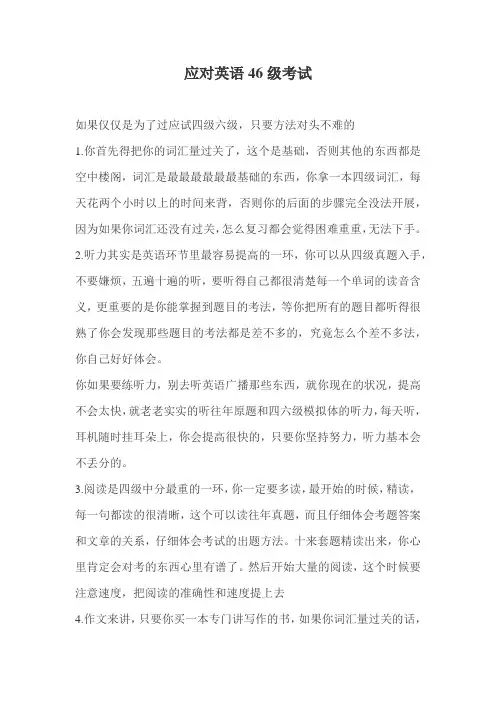
应对英语46级考试
如果仅仅是为了过应试四级六级,只要方法对头不难的
1.你首先得把你的词汇量过关了,这个是基础,否则其他的东西都是空中楼阁,词汇是最最最最最最基础的东西,你拿一本四级词汇,每天花两个小时以上的时间来背,否则你的后面的步骤完全没法开展,因为如果你词汇还没有过关,怎么复习都会觉得困难重重,无法下手。
2.听力其实是英语环节里最容易提高的一环,你可以从四级真题入手,不要嫌烦,五遍十遍的听,要听得自己都很清楚每一个单词的读音含义,更重要的是你能掌握到题目的考法,等你把所有的题目都听得很熟了你会发现那些题目的考法都是差不多的,究竟怎么个差不多法,你自己好好体会。
你如果要练听力,别去听英语广播那些东西,就你现在的状况,提高不会太快,就老老实实的听往年原题和四六级模拟体的听力,每天听,耳机随时挂耳朵上,你会提高很快的,只要你坚持努力,听力基本会不丢分的。
3.阅读是四级中分最重的一环,你一定要多读,最开始的时候,精读,每一句都读的很清晰,这个可以读往年真题,而且仔细体会考题答案和文章的关系,仔细体会考试的出题方法。
十来套题精读出来,你心里肯定会对考的东西心里有谱了。
然后开始大量的阅读,这个时候要注意速度,把阅读的准确性和速度提上去
4.作文来讲,只要你买一本专门讲写作的书,如果你词汇量过关的话,
把历年的作文都写写,并找学的好的人好好改改,多背一些比较好的英语句子,写作文用处非常大,这个在很多教材里都有。
一般来说掌握一些常用的巨型,就很容易写出很漂亮的文章了。

46级英语报考条件
46级英语的报考条件如下:
1. 全日制普通高等院校在读专科学生、本科学生、研究生;
2. 修完大学英语四级课程的在读学生可以报考英语四级;
3. 修完大学英语六级的课程且英语四级的考试成绩合格的考生可以报考英语六级;
4. 具有同等学力的大专学生或硕士研究生经所在学校同意,可在本校报名参加英语四六级的考试;
5. 具有成人教育资格的考生。
需要注意的是,英语四六级不再对社会考生开放,只能在校大学生报考。
而且,规定时间内报名,四六级每年有两场考试,6月和12月,报名一般提前3个月。
以上信息仅供参考,如果您还有疑问,建议咨询所在学校老师。
46级英语与基础英语区别
46级英语与基础英语有以下几点区别:
1.水平差异:46级英语是指高级水平的英语,包含了更加复杂和高级的语法结构、词汇量和语言技巧。
而基础英语则是指初级水平的英语,主要涉及基本的语法和词汇知识。
2.应用范围:46级英语通常用于高级英语考试、大学英语课程以及专业英语学习。
而基础英语主要用于初级英语课程、入门级别的英语学习,以及日常生活中的基本沟通。
3.学习目标:46级英语的学习目标是为了提高英语水平,能够流利地运用英语进行复杂的交流和写作。
而基础英语的学习目标是建立起英语的基础,能够进行简单的交流和阅读。
4.难易程度:由于46级英语是高级水平,所以相对来说更加难以掌握和运用,需要较长时间的学习和实践。
而基础英语则相对简单,容易入门,学习周期相对较短。
总的来说,46级英语和基础英语在水平、应用范围、学习目标和难易程度上存在差异。
根据个人的学习目标和需求,选择适合自己的英语水平进行学习是很重要的。
46级英语练习题一、听力理解(共15分)1. 听下面一段对话,选择正确的答案。
- 男:Hey, have you decided which book to read for ourbook club next week?- 女:Yes, I have. I'm going to suggest "The Great Gatsby."- 问题:What book will the woman suggest for the book club?A. "1984"B. "The Great Gatsby"C. "To Kill a Mockingbird"答案:B2. 听下面一段短文,回答以下问题。
- 短文:In the past decade, the use of smartphones has skyrocketed, and it has become an integral part of people's daily lives. People use smartphones for various purposes,such as communication, entertainment, and information gathering.- 问题:What is the main topic of the passage?A. The history of smartphonesB. The increasing use of smartphonesC. The different purposes of smartphones答案:B二、阅读理解(共30分)阅读下面的短文,然后回答问题。
短文一:In recent years, the popularity of online courses has surged. Many people are now taking advantage of the flexibility and convenience that online learning provides. However, someargue that online courses lack the personal interaction and engagement that traditional classroom settings offer.问题1:What is the main idea of the passage?A. The benefits of online coursesB. The drawbacks of online coursesC. The increasing popularity of online coursesD. The comparison between online and traditional courses问题2:What is the author's opinion on online courses?A. They are better than traditional courses.B. They lack personal interaction.C. They are not as effective as traditional courses.D. The author does not express an opinion.短文二:The environmental impact of plastic waste has become a global concern. Many countries have started to implement policies to reduce plastic usage, such as banning single-use plastic bags. Additionally, there is a growing interest in biodegradable alternatives to plastic.问题3:What is the focus of the passage?A. The environmental impact of plastic wasteB. The policies to reduce plastic usageC. The alternatives to plasticD. All of the above问题4:What action has been taken by some countries?A. They have increased plastic production.B. They have banned single-use plastic bags.C. They have promoted the use of plastic.D. They have ignored the issue.三、词汇与语法(共25分)1. 用括号中所给词的适当形式填空。
英语46级往年作文真题及答案以下是根据您的要求撰写的几段模拟的英语四六级作文真题的范文段落,每个段落都尽量保持口语化且风格各异:---。
段落一(描述场景)。
Last weekend, I went to the countryside with my friends. The air was so fresh, and the sky was a perfect blue. We walked along the river, chatting and laughing. It was sucha relaxing day!段落二(表达观点)。
I strongly believe that technology has made our lives easier. With the internet, we can access information from anywhere in the world. And smartphones allow us to stay connected with friends and family at all times.段落三(讲述经历)。
Once, I participated in a volunteer trip to a remote village. It was an eye-opening experience. The children there had so few resources, but their smiles and enthusiasm for learning were inspiring.段落四(分享感受)。
Watching the sunset over the ocean always fills me with a sense of peace and wonder. The colors change from orange to pink, and the sky seems to stretch on forever. It's a moment of pure beauty that I never get tired of.段落五(提出建议)。
听力一. 应试技巧以WHAT为提问词引导的问句1. 问”什么含义”What does the man imply?What does the woman’s answer suggest?What does the woman say about..(共出现32次)2. 问”从对话中能获得什么信息或结论”What can we learn/know about the man?What do we know from the woman’s r eply?What can be inferred about…(共出现37次)3. 问”做什么”What does the man promise to do? (共出现14次)4. 问”对某人或某事有什么看法’How does the man feel about… (出现4次)小结:在短对话部分,考查最多的是WHAT类的提问,其中细节的考查相对较少,推断型的相对较多一些.二:常见考题类型1原因与结果题特征:1.至少有一个选项暗示出该事实能导致某种结果,通常有好几个选项的事实能导致同一结果2.选项中可能出现can’t, not be able to, too….to, have to等词或词组.3.文章承上启下的作用的信息句a.表示文章顺序与层次的句子,一般由first, second, in the end, in addition, furthermore, finally引导.b.表示意思转折的句子,一般由but, however, on the contrary, instead, unfortunately, however, yet, although, nevertheless等词引导c.表示因果关系的句子,一般由because, since, for, thus, as a result等引导2.职业与身份题特征:大部分情况下,选择项是有固定格式的,要么是4个不同的职业,要么是4个不同身份的人短语:a little out of the way 有点远三. 长对话应试技巧注意:问答形式的对话是考试重点,往往落在其答语上.并且不是每一组问答都是重点,作为考试重点的几组问题之间的关联性是不大的.换句话说,第一个问题考查了文章的主旨,第二个问题开始分别考查对话中所呈现的几方面问题.其中每一个方面选择一个最重要的问题来考查.并且部分长对话还秉承了短文理解的一个重要的考查方式,就是在对话的开头部分一定会出题目方法:1.话题与场景的判断----第一句话中的核心词汇揭示答案在长对话中,寒暄过后的第一句话一般起到引出话题的作用,很可能是对话的主题所在,也是回答主旨,话题以及场景题的依据,正确的答案往往是核心词汇的重现,同义词,或者是由该单词所得出的自然的推论.2.细节题---听到什么选什么与短对话的区别就在于,短对话中一般采用的原则是听到什么就不选什么,而长对话恰恰相反,它考查的重点是那些含有实际意义的问答内容,尤其是特殊疑问句3.根据结尾处的核心词汇锁定答案长对话中一个出题规律就是在结尾处,针对将要做什么.或者提出什么建议进行提问.因此答题的关键就在于锁定结尾处的核心词四. 场景分析1. 教务场景解题思路:教务人员描述各项事务的细节问题,时间,地点,计划推迟或变更的原因等往往是考查的重点2. 选课场景解题思路:学生觉得课程太难,负荷太重3. 补课场景解题思路:场景人物一般是同学之间的补课,在补课过程中,一方会有一些问题,而另外一方将一一给予澄清4. 论文场景解题思路:场景人物一般是教授与学生,或者学生之间进行讨论.论文的题目难以确定,资料太难找,题目太偏,查不到资料,题目太大,要找的资料太多,太杂.5. 体育场景解题思路:目的不在于比赛,而是好玩,健身,交友.一些运动,如CYCLING,往往是以TEAM,CLUB或者ASSOCIATION的形式存在的6. 租房场景解题思路:学生一般倾向与找价格地的房子,所以房子的条件一般比较差.经常会出现一些毛病,由于房子紧张.找房子,租房子的过程往往很不容易7. 吃饭场景解题思路:往往在吃饭过程中,遇到等待时间过长,饭菜不如意等提出投诉,得到赔偿等8. 工作相关类解题思路:应聘者介绍自己的情况,如:教育背景,特长等,聘方人员一般要介绍工作的性质,工资待遇以及上下班时间9. 采访座谈类解题思路:被访者在某一方面或几方面比较成功,访问者就其某一方面的成就提出问题.并由被访问者谈体会或经验,提出以后的计划等.应试技巧:注意重复的词语,他们通常会给你一些线索,还会帮助你回忆你在题目中听过的名称,注意各个选项中的不同点,注意一些不同的名字,地点,以及不同的动词五:命题研究方法:注意集中精力听好短文开头.因为4级喜欢把中心置于文章的开头.文中反复出现同一单词或同一类单词,也值得注意,包含与这类单词的选项能较好的体现中心,通常是正确答案.文中一旦出现以因果连词(because, so, due to,等)和转折连词(如but, however, though等)引导的句子也要格外留心,这些地方往往是考点.抓数字时间1. 出现年代,时间,数字中的任何一种,文章中的数字时间肯定是考试重点2. 文章中出现2个以上的数字时间,该句肯定含有答案3. 数字时间定位包括年代定位和过去现在对比定位2种形式4. 数字时间和比较级最高级组合在一起的时候,或是数字时间出现在文章的开始和结束时,答案肯定在附近.注意:推理判断题的问法有:What does the speaker most concerned about?六.复合式听写应试技巧特点:名词的单复数问题一直是复合式听写考查名词的一个重点方法:第一遍:全文朗读,填空处无停顿,以听为主,借助文字材料理解和把握全篇内容和脉络,:顺便填写有把握的单词,记一点笔记第二遍:尽量记住所听的句子的各个意群,并快速记下.第三遍:着重弥补为听清的部分,并检查有无错误,要写完整的句子,而不是单个词或短语注意:1.某个单词为听清,或拼写不出,没有把握,可换词或改变表达方式.要尽量忠实的表达文章的意思而不出现语言错误.句子较长而无法准确抓住每个词,应力争听懂句意,记下要点和关键词语,然后试着用自己的话表达,关键词一般为实词,如名词,动词,形容词,副词等.2.转折引起的作者态度及谈论重点的变化回答通常是:Sounds great, Sounds a lot of fun, but…..3.尾词对于解题起着很大的干扰作用,答题时应多加小心听力的提问方式的常见4种类型1.主题思想题例如:what is the best title for this passage?方法:听好短文的开头和文中反复出现的同一词汇或同一类词汇,因为包含这类词汇的选项能较好的体现中心思想,其通常为正确答案。
46级英语与基础英语区别摘要:一、引言二、46级英语与基础英语的区别1.难度等级2.教材内容3.教学方法4.学习目标三、如何适应46级英语学习1.提高词汇量2.加强语法学习3.增加阅读练习4.注重听力训练四、总结正文:【引言】作为一名职业写手,今天我要与大家分享的主题是46级英语与基础英语的区别以及如何适应46级英语学习。
相信很多同学在学习英语的过程中,都会对这个话题感兴趣。
接下来,让我们详细了解这两种英语的区别及应对策略。
【46级英语与基础英语的区别】46级英语,全名为大学英语四级考试,是我国高校学生必须参加的英语水平测试之一。
它与基础英语在学习难度、教材内容、教学方法和学习目标等方面存在一定差异。
1.难度等级:46级英语相较于基础英语,难度有所提高。
它要求学生具备更高的英语应用能力,以应对日益复杂的学术和社交场景。
2.教材内容:46级英语教材更加注重实用性,紧密结合现实生活,让学生在学习和实践中更好地掌握英语。
而基础英语教材主要以培养学生基本语言能力为主,内容相对简单。
3.教学方法:46级英语教学更注重培养学生的自主学习能力和实践能力,倡导任务型、情景式教学。
基础英语教学则以教师为主导,侧重于语法和词汇的讲解。
4.学习目标:46级英语的学习目标旨在检验学生是否具备进入社会或继续深造所需的语言能力。
基础英语的学习目标则在于培养学生具备基本的英语听说读写能力。
【如何适应46级英语学习】面对46级英语的学习要求,学生需要从以下几个方面进行努力:1.提高词汇量:46级英语考试要求学生掌握较高级的词汇,因此扩大词汇量是关键。
可以通过阅读英文文章、词典等多种途径来积累词汇。
2.加强语法学习:46级英语考试语法题占比较高,学生需要熟练掌握英语语法规则,提高自己的英语表达能力。
3.增加阅读练习:46级英语考试阅读理解部分难度较大,学生需通过多读英文文章、新闻等,提高阅读速度和理解能力。
4.注重听力训练:46级英语考试听力部分要求学生具备较高的听力水平。
1.abide by(=be faithful to ; obey)忠于;遵守。
2. be absent from….缺席,不在3. absence of mind(=being absent-minded)心不在焉4. absorb(=take up the attention of)吸引…的注意力(被动语态)be absorbed i n全神贯注于…近be engrossed in ; be lost in ; be rapt in ;be concentrated on ; be focused on ; be centered on5. (be) abundant in(be rich in; be well supplied with)富于,富有6. access(to) (不可数名词)能接近,进入,了解7. by accident(=by chance, accidentally)偶然地,意外. Without accident(=safely)安全地,8. of one’s own accord(=without being asked; willingly; freely)自愿地,主动地9. in accord with与…一致. out of one’s accord with同….不一致10. with one accord (=with everybody agreeing)一致地11. in accordance with (=in agreement with)依照,根据12. on one’s own account 1)为了某人的缘故,为了某人自己的利益2) (=at one’s own risk)自行负责3) (=by oneself)依靠自己on account赊账; on account of因为; on no account不论什么原因也不;of …account有…..重要性.13. take…into account(=consider)把...考虑进去14. give sb. an account of说明,解释(理由)15. account for (=give an explanation or reason for)解释,说明.16. on account of (=because of)由于,因为.17. on no account(=in no case, for no reason)绝不要,无论如何不要(放句首时句子要倒装)18. accuse…of…(=charge…with; blame sb. for sth. ; blame sth. on sb. ; complain about)指控,控告19. be accustomed to (=be in the habit of, be used to)习惯于.20. be acquainted with(=to have knowledge of)了解; (=to have metsocially )熟悉21. act on奉行,按照…行动; act as扮演; act for代理22. adapt oneself to(=adjust oneself to)使自己适应于23. adapt…(for) (=make sth. Suitable for a new need)改编,改写(以适应新的需要)24. in addition (=besides)此外,又,加之25. in addition to(=as well as, besides, other than)除…外26. adhere to (=abide by, conform to, comply with, cling to, insist on, pe rsist in, observe, opinion, belief )粘附;坚持,遵循27. adjacent(=next to, close to)毗邻的,临近的28. adjust..(to) (=change slightly)调节;适应;29. admit of (=be capable of, leave room for) …的可能,留有…的余地.30. in advance (before in time)预告,事先.31. to advantage有利的,使优点更加突出地.32. have an advantage over胜过. have the advantage of由于…处于有利条件have the advantage of sb.知道某人所不知道的事33. take advantage of (=make the best of, utilize, make use of, profit from, harness)利用.34. agree with赞同(某人意见) agree to同意35. in agreement (with)同意,一致36. ahead of在…之前,超过…;……………. ahead of time提前.37. in the air 1)不肯定,不具体. 2)在谣传中.38. above all (=especially, most important of all)尤其是,最重要的.39. in all (=counting everyone or everything, altogether)总共,总计40. after all毕竟,到底; (not) at all一点也不; all at once(=suddenly)突然; once and for all只此一次; above all最重要的; first of all首先; all in all 大体上说; be all in累极了; all but几乎.41. allow for (=take into consideration, take into account)考虑到,估计到.42. amount to (=to be equal to)总计,等于.43. answer for (undertake responsibility for, be liable for, take charge for)对…负责.44. answer to (=conform to)适合,符合.45. be anxious about为…焦急不安;或anxious for46. apologize to sb. for sth.为…向…道歉47. appeal to sb. for sth.为某事向某人呼吁. appeal to sb.对某人有吸引力48. apply to sb. for sth.为…向…申请; apply for申请; apply to适用.49. apply to与…有关;适用50. approve of (=consent to, be in favor of, favor, agree to, consider good, right)赞成, approve vt.批准51. arise from(=be caused by)由…引起.52. arrange for sb.sth. to do sth.安排…做…53. arrive on到达; arrive at到达某地(小地方);得出,作出; arrive in到达某地(大地方);54. be ashamed of (=feel shame, guilt or sorrow because of sth. done)以…为羞耻55. assure sb. of sth. (=try to cause to believe or trust in sth.)向…保证,使…确信.56. attach(to) (=to fix, fasten; join)缚,系,结57. make an attempt at doing sth. (to do sth.)试图做…58. attend to (=give one’s attention, care and thought)注意,照顾;attend on(upon)(=wait upon, serve, look after)侍候,照料59. attitude to toward …对…的态度.看法60. attribute…to…(=to believe sth. to be the result of…)把..归因于..,认为..是..的结果61. on the average (=on average, on an average)平均62. (be) aware of (=be conscious of , having knowledge or consciousness)意识到,知道.63. at the back of (=behind)在…后面64. in the back of在…后部(里面); on the back of在…后部(外面); be on one’s back(=be ill in bed)卧病不起.65. at one’s back(=supporting or favoring sb.)支持,维护; have sb. at one ’s back有…支持,有…作后台66. turn one’s back on sb. (=turn away from sb. in an impolite way)不理睬(某人),背弃,抛弃67. behind one’s back背着某人(说坏话)68. be based on upon基于69. on the basis of根据…,在…基础上70. beat…at在…运动项目上打赢71. begin with以…开始. to begin with (=first of all)首先,第一(经常用于开始语)72. on behalf of (=as the representative of)以…名义73. believe in(=have faith or trust in; consider sth.sb. to be true)相信,依赖,信仰.74. benefit (from)受益,得到好处.75. for the benefit of为了…的利益(好处)76. for the better好转77. get the better of (=defeat sb.)打败,胜过.78. by birth在出生上,论出身,按血统at birth在出生时; give birth to出生79. blame sb. for sth.因…责备某人. blame sth. on sb.把…推在某人身上80. in blossom开花(指树木) be in blossom开花(强调状态) come into blossom开花(强调动作)81. on board到船上,在船上,上火车或飞机82. boast of (or about)吹嘘83. out of breath喘不过气来84. in brief(=in as few words as possible)简言之85. in bulk成批地,不散装的86. take the floor起立发言87. on business出差办事.88. be busy with sth.于某事。